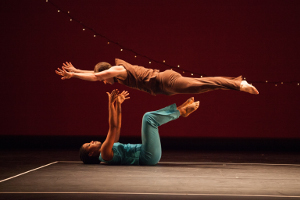 The first concert of Greensboro’s Music for a Sunday Evening in the Park (MUSEP) was held in the Van Dyke Performance Space and streamed live from the Greensboro Cultural Center on Creative Greensboro’s Facebook page. Ryan Deal (Chief Creative Economic Officer) and Josh Sherrick (Superintendent of Arts, Culture and Special Events) introduced themselves and gave some introductory remarks about Creative Greensboro and MUSEP.
The first concert of Greensboro’s Music for a Sunday Evening in the Park (MUSEP) was held in the Van Dyke Performance Space and streamed live from the Greensboro Cultural Center on Creative Greensboro’s Facebook page. Ryan Deal (Chief Creative Economic Officer) and Josh Sherrick (Superintendent of Arts, Culture and Special Events) introduced themselves and gave some introductory remarks about Creative Greensboro and MUSEP.
First up was Kay & Adriel, an alternative/soul duo from High Point. The two launched into an original “healing” song, “Uncle Sam,” written and sung by Kay. The moderate-tempo haunting tune was punctuated by Adriel’s rhythmic acoustic guitar. A song about Thomas Jefferson’s enslaved concubine, “Sally Hemings,” followed. Alicia Keys’ “Fallin'” was a gritty cover with both performers singing. Their set concluded with Otis Redding’s iconic “(Sittin’ on) The Dock Of The Bay” with Kay singing.
Philharmonia director Peter Perret introduced the second portion of the program, beginning with Folk Suite No. 4 by William Grant Still (United States, 1895-1978), performed by the Cambiata Quintet (Nancy Thurston, flute; Susan Kundert, oboe; John Walker, clarinet; Caroline Shogry, bassoon; and Mary Sylvester, French horn).
The work is based on three Latin American songs. The first, from Venezuela is “El monigote” (“The Puppet”); the perky oom-pah accompaniment helped make this a lively winner. “Anda buscando de rosa en rosa” (“He went searching from rose to rose”) hails from Mexico and is slow and graceful. The finale Brazilian dance, “Tayeras,” is jazzy with a quirky accompaniment. The quintet played with good energy and ensemble.
Henry Restorff (United States, early 20th century) is best known as a band director. His composition, The Bluebird’s Call, is a multi-section piece, originally written for piano, but here played in arrangement for piccolo (Chuck Coltrane) and piano (James Esterline). There are some birdcalls from the piccolo, of course, and the piano primarily serves as an accompaniment and transition between sections. Coltrane and Esterline presented a solid performance of this fun piece.
Another duo consisting of Bill Wilson (violin) and Austin Propst (contrabass) provided improvisations on three American songs. An upbeat “Dinah” was written by Harry Akst (1894-1963) and Sam M. Lewis (1885-1959). A more somber “I’ll See You in My Dreams” was written by Isham Jones (1894-1956). “What Can I Say After I Say I’m Sorry” was penned by Walter Donaldson (1893-1947) and Abe Lyman (1897-1957) and is a bit bluesy. Throughout both Wilson and Propst supported each other in these easy-to-listen-to improvs (think Stephane Grappelli).
The two also played “La Cumparsita” (“Little street procession”) by Gerardo Matos Rodriguez (Uruguay, 1897-1948). The tango definitely had a definite Latin feel.
A complete contrast was found in “Komm,süsser Tod” (“Come sweet death”), S.478, by Johann Sebastian Bach (Germany, 1685-1750). This most unusual arrangement by tubist William Bell (United States, 1901-1971) featured Roger Carmichael (tuba) and James Esterline (piano). Carmichael solidly intoned the chorale tune strongly supported by Esterliine.
Next came three pieces for flute trio, played by Coltrane, Thurston, and Sandra Funk starting with two favorite traditional Irish tunes “Londonderry Air” mixed with “The Irish Washerwoman.”
The opening Allegro moderato from Flute Trio in G, Op. 24, by Kaspard Kummer (Germany, 1795-1870) is a light classical piece. Originally written for piano, “Dizzy Fingers” by Edward Elzear “Zez” Confrey (United States, 1895-1971) proved to be a delight, with fast swoops – it would be fun to hear the original as well.
“La femme à barbe” (“The Bearded Lady”) is a movement from Tableaux forains (Fairground paintings) by José Berghmans (France, 1921-92). Nicely played by David Guion (trombone) and James Esterline (piano), this multi-sectioned musical caricature is a bit poignant with quirky, humorous sections as well.
The famous Allegretto movement from Symphony No. 7 in A, Op. 92, by Ludwig van Beethoven (Germany, 1720-1827) has been arranged in many ways. This cello quintet (arranged by North Carolinian Wendy Bissinger) featured Thomas Graham, David Gilbert, Melanie Tuttle, May Wells, and Nancy Clark. The music material was pretty equally distributed between the five. This gem is a pleasure to hear in any arrangement.
Two compositions by Astor Piazzolla (Argentina, 1921-92) were offered by Eve Hubbard (violin), Margaret Petty (cello) and Lyn Gentry (piano). Estaciones porteñas (The Four Seasons of Buenas Aires) is an Argentinian’s take on Vivaldi’s Four Seasons. Two seasons, “Primavera porteña” (“Spring”) and “Verano porteña” (“Summer”) were performed. Both are chocked full of Latin rhythms and spikey fast sections contrasted with slow, expressive melodies. The lovely and gently flowing slow dance, “Oblivion,” provided a great foil. The trio played with feeling and sensitivity.
Ending the ambitious program was the cute five-minute “Starý bručoun” (“The Old Grumbler”), Op. 210, by Julius Fučík (Czechoslovakia, 1872-1962), played by the Cambiata Quintet. After a short introduction, the tune proper is presented primarily by the bassoon, contrasting sections follow, with different, light-hearted musical depictions. Good humor was displayed throughout.
The backdrop, a picture of a lush green park reminded us of where we might have gathered had it not been for the COVID-19 pandemic.












